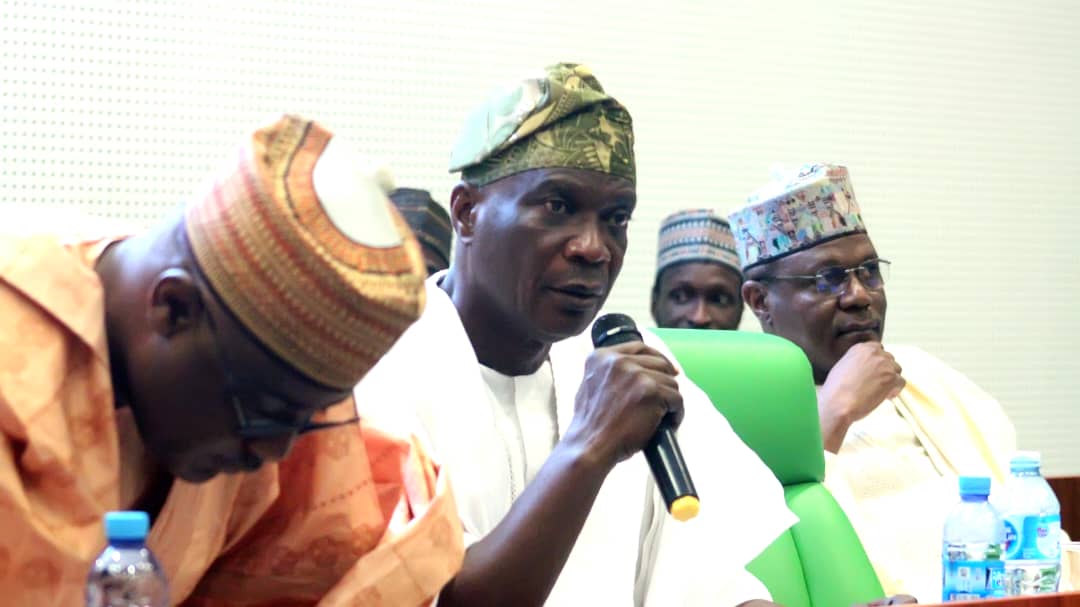Agriculture
Organic Produce must be first certified – Don

A lecturer with the Federal College of Agriculture, Moor Plantation, IbadanDr Olufemi AyanfeOluwa, has stated that no agriculture produce should be termed organic except it is certified by the appropriate bodies.
AyanfeOluwa who said this during his online presentation on Organic Agriculture Standard and Certification, organised by Journalists Go Organic Movement, added, `if it is not certified, it may not be organic’.
He said that it is not sufficient to personally claim that one’s production is organic, but that there should be a link to benchmark reference regarding practices of Organic Agriculture.
“Standards could also be said to be a set of rules and regulations guiding any production, while Certification means an audit process to evaluate compliance to an established standard.
” Therefore, organic agriculture business is an organised system based on integrity and quality assurance.
” Organic standards’ are sets of definitions, requirements, recommendations and restrictions regarding the practices and materials that can be used within certified organic production and processing systems.
” These documented standards define the requirements that a producer/processor must meet before the certifying organisation will certify the enterprise ‘organic.”
AyanfeOluwa noted that Organic Agriculture Standard and Certification are important tools for Organic Agriculture business.
” We also have a standard in Nigeria “Organic Agriculture Standard in Nigeria” and anybody claiming to be practising organic agriculture without following any known standard is rather joking’’.
He enumerated the types of certification programmes available to farmers who may be interested in having their produce certified.
“We have individual or self-claimed called First Party Certification; Self claimed means that, the farm has not gone through audit process (certification) and it is only the farmer that could claim what he/she is doing is organic.
Thus, only close persons who could trust such a person would buy into his produce/products.
“Participatory Guarantee Systems (PGS) which is Second party: are quality assurance initiatives using their own written standards, often based on the International Federation of Organic Agriculture Movements (IFOAM) Basic Standards.
” PGS are specific to individual communities, geographic areas, politics and their markets and the methods of verification that are used vary. Credibility is ensured through the participation of all stakeholders involved in production and consumption of organic products.“The word participatory means that both the producers and consumers are involved in the certification process.
“PGS which also shares a common goal with third party certification in providing a credible guarantee for consumers seeking organic produce locally, and is much cheaper and accessible.
” Thus, it makes it easier for organic farmers with small holdings which characterise agriculture in Africa to market their produce locally as organic, having access to certification through PGS.
“It should be noted that PGS certified products could only be sold within your country/region, but cannot be exported as organic, and this is one of the limitations of PGS’’.
He said Third Party Certification, (TPC) is in contrast to first party (self) certification and second party certification that are carried out by a body closely related to the supply chain.
“TPC is viewed as more reliable and credible than first and second-party certifications, because the credibility of the Third Party certifier itself is backed up by accreditation.
” Accreditation is either provided by private or public sector often by, or with the consent of, public authorities and requirements for accreditation are laid down in ISO 65 which is endorsed by the European Union as EN 45011.
” To export produce/products to any country, you must produce and be certified based on the standards of that country.
According to him, if you are targeting the US market, you must produce and be certified based on National Organic Programme (NOP).
” Such certification could only be handled by an independent accredited body which is a third party between the producer and the consumers in the targeted country.
” Third party certification could be very expensive and complex, and therefore makes it unaffordable for a small scale farmer.
” You require a large volume of production to be able to offset the cost of certification. Third party certification could be as costly as 5,000 pounds or more,” he said.
Agriculture
House Moves to Overhaul Livestock Sector, Investigate ₦498.7m Unpaid Poultry Farmers’ Compensation — Wale Raji

By Cyril Ogar
The House of Representatives Committee on Livestock Development has announced plans to overhaul Nigeria’s livestock sector and investigate the Federal Government’s failure to pay ₦498.7 million in compensation to 307 verified poultry farmers affected by bird flu outbreaks between 2021 and 2023..
Chairman of the Committee, Hon. Wale Raji, disclosed this on Thursday during a public hearing on six livestock-related bills held at the National Assembly Complex, Abuja. The proposed bills seek to establish livestock colleges and research institutes across the country to promote animal production, veterinary education, and professional training.
Raji explained that the public hearing was convened to enable stakeholders to contribute ideas aimed at strengthening livestock development and resolving the challenges faced by farmers, particularly those impacted by avian influenza.
“This engagement provides stakeholders a platform to make meaningful input that will enhance productivity, create jobs, and promote sustainable livestock growth,” Raji stated.“However, we are deeply concerned about the delay in compensating affected poultry farmers, and we are determined to ensure transparency and accountability in the entire process.”
₦498.7 Million Still Outstanding
Representing the Permanent Secretary of the Federal Ministry of Livestock Development, Dr. Chinyere Akujobi, the Director of Veterinary Services, Dr. Adeniyi Adedoyin, confirmed that ₦498.7 million remains unpaid to 307 poultry farmers whose flocks were destroyed during bird flu outbreaks between 2021 and 2023.
According to him, ₦3.16 billion had earlier been disbursed to 1,055 farmers affected by previous outbreaks, but the latest phase of payments was stalled due to funding shortfalls. He added that a recent outbreak in Wukari, Taraba State, led to the culling of over 2,000 birds, with compensation yet to be processed.
Adedoyin attributed the delay to inadequate budgetary provisions and the absence of an Animal Diseases Contingency or Emergency Fund (ADEF), explaining that no dedicated fund for animal disease response has existed since 2021.
“Most affected farmers also lack insurance coverage as required by law, further complicating the compensation process,” he said.
He noted that in 2022, the Federal Executive Council (FEC) approved a revised compensation formula—50% from the Federal Government, 25% from the state, and 25% from farmers—restricting eligibility to smallholders with flocks under 3,000 birds.
Lawmakers Push Livestock Reform Agenda
Hon. Raji emphasized that the committee’s probe and reform efforts are in line with the National Livestock Transformation Plan (NLTP), which seeks to modernize animal husbandry, enhance veterinary services, and improve productivity across the value chain.
“Our goal is to build a vibrant and sustainable livestock sector that contributes meaningfully to food security, employment generation, and economic diversification,” he said.“We will also work to ensure that farmers receive their compensation and that government creates an emergency response fund to prevent future delays.”
He assured that the committee will pursue full implementation of the hearing’s recommendations to strengthen policy, research, and training in the livestock industry.
Push for New Livestock Institutions
Among the bills under consideration is one sponsored by Hon. Bello Ka’oje (Kebbi State) seeking to establish the Federal College of Animal Husbandry, Ka’oje. The proposed college will serve as a centre for research, training, and innovation in livestock production.
Ka’oje said the institution would improve animal breeding, promote best practices in livestock care, and drive productivity and employment.
“This initiative aims to advance livestock development through professional training and innovation,” he stated.“It will help strengthen food security, create jobs, and raise the standard of animal production in Nigeria.”
He noted that Nigeria continues to trail behind countries such as Egypt, Kenya, and Ethiopia, ranking 94th in global milk production and 33rd in meat production as of 2022, despite its vast agricultural resources.
Commitment to Accountability and Growth
Hon. Wale Raji reaffirmed the House’s commitment to transparency and effective oversight in livestock management.
“We will ensure that every stakeholder in the livestock value chain benefits from government policies and programmes,” he said.“Our ultimate goal is to reposition the livestock industry as a key driver of national growth, rural development, and economic stability.”
-

 Featured6 years ago
Featured6 years agoLampard Names New Chelsea Manager
-

 Featured6 years ago
Featured6 years agoFG To Extends Lockdown In FCT, Lagos Ogun states For 7days
-

 Featured6 years ago
Featured6 years agoChildren Custody: Court Adjourns Mike Ezuruonye, Wife’s Case To April 7
-

 Featured6 years ago
Featured6 years agoNYSC Dismisses Report Of DG’s Plan To Islamize Benue Orientation Camp
-

 Featured4 years ago
Featured4 years agoTransfer Saga: How Mikel Obi Refused to compensate me After I Linked Him Worth $4m Deal In Kuwait SC – Okafor
-
Sports3 years ago
TINUBU LAMBAST DELE MOMODU
-

 News11 months ago
News11 months agoZulu to Super Eagles B team, President Tinubu is happy with you
-
Featured6 years ago
Board urges FG to establish one-stop rehabilitation centres in 6 geopolitical zones
